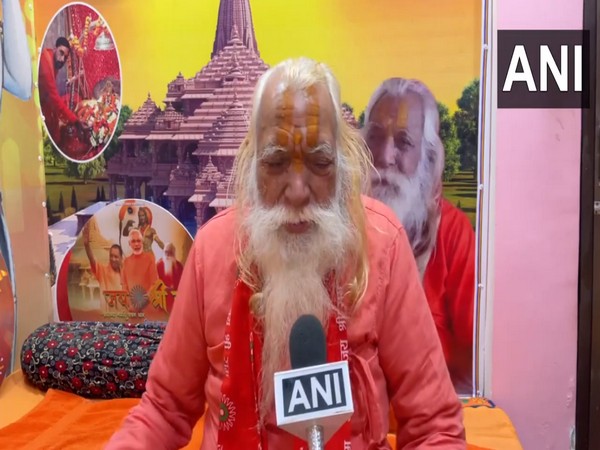Ayodhya (Uttar Pradesh) [India]: Shri Ram Janmabhoomi Teerth Kshetra Chief Priest Acharya Satyendra Das on Monday said that with the Pran Pratishtha ceremony, Ram Rajya will begin and all the inequalities will be over.
“From today, Ram Rajya will begin with Pran Pratishtha. All the inequalities will be over. Everyone will behave with love. From Ayodhya the change that will come to the entire country and it will be very beautiful. And everyone will live in harmony. We will live with goodwill. Lord Ram’s blessing will fall on everyone,” said Acharya Satyendra Das.
“…Everything is happening very well. What Ram Bhakts wanted, is getting fulfilled today…As soon as Ram Lalla is seated…all difficulties will end…” added the priest.
Meanwhile, Ayodhya is set to go down in history with the much-awaited Pran Pratishtha of Shri Ram Lalla at the Ram Temple on Monday.
The ‘Pran Pratistha’ of Ram Lalla is scheduled for Paush Shukla Kurma Dwadashi, Vikram Samvat 2080, which falls today, January 22.
The day will start with a morning puja followed by the Pran Pratishtha of Ram Lalla in ‘Mrigashira Nakshatra’, which is expected to start around 12.30 pm and end at 1 pm.
The ceremony will witness the esteemed presence of Prime Minister Narendra Modi, Rashtriya Swayamsevak Sangh chief Mohan Bhagwat, Governor Anandiben Patel, and Chief Minister Yogi Adityanath, among other dignitaries.
Army helicopters will shower flowers on Ayodhya and 30 artists will play different Indian musical instruments at the temple premises at the time of Aarti at Ram Janmabhoomi temple on Pran Pratishtha day, according to Temple Authorities.
Temple authorities also say that all the guests will be given bells which they will be ringing during the Aarti.
The 30 musicians who will be performing will be playing their instruments in unison at some point in time, sources added.
The historic Pran Pratishtha ceremony will be attended by representatives of all major spiritual and religious sects of the country. People from all walks of life including representatives of various tribal communities will also attend the ceremony. Prime Minister will address this distinguished gathering on the occasion.
Following all the Shastriya protocols, the programme of Pran Pratistha will be held in the Abhijeet Muhurta in the afternoon.
Generally, there are Seven Adhivasas in Pran Pratistha ceremony, and a minimum of three Adhivasas are in practice. There will be 121 Acharyas conducting the rituals. Ganeshwar Shastri Dravid will be overseeing, coordinating and directing all the proceedings of the Anushthan, and the principal Acharya will be Lakshmikant Dixit of Kashi.
Pran Pratishtha will be conducted in the presence of Prime Minister Modi, Sarsanghchalak of the Rashtriya Swayamsevak Sangh Mohan Bhagwat, Governor of Uttar Pradesh Anandiben Patel, Chief Minister of U.P. Yogi Adityanath and other dignitaries.
Acharyas of all schools of Bharatiya spiritualism, religion, sect, system of worship, tradition, Sants of more than 150 traditions, Mahamandaleshwars, Mandaleshwars, Shrimahants, Mahants, Nagas, as well as leading figures of more than 50 Adivasi, Girivasi, Tatavasi, Dwipavasi tribal traditions, will remain present to witness the Prana Pratistha ceremony on the premises of the Bhavya Shri Ram Janmabhoomi Mandir.
The presence of the tribal traditions being represented by the people of the hills, forests, coastal belts, islands, etc., is happening for the first time in recent history.
The traditions include Shaiva, Vaishnav, Shaakta, Ganapatya, Patya, Sikh, Bauddha, Jain, Dashnam, Shankar, Ramanand, Ramanuj, Nimbarka, Madhva, Vishnu Nami, Ramsanehi, Ghisapanth, Garibdasi, Gaudiya, Kabirpanthi, Valmiki, Shankardev (Assam), Madhav Dev, ISKCON, Ramakrishna Mission, Chinmaya Mission, Bharat Sevashram Sangha, Gayatri Parivar, Anukul Chandra, Thakur Parampara, Mahima Samaj of Odisha, Akali, Nirankari, Namdhari from Punjab, Radhasoami, and Swaminarayan, Varkari, Veer Shaiva, etc.
After the completion of the Pran Pratishtha programme in the Garbha-Griha, all the witnesses will have darshan respectively.
The magnificent Shri Ram Janmbhoomi Mandir is constructed in traditional Nagara style. Its length (east-west) is 380 feet; width 250 feet and height is 161 feet; and is supported by a total of 392 pillars and 44 doors. The pillars and walls of the temple showcase intricately sculpted depictions of Hindu deities, gods, and goddesses. In the main sanctum sanctorum at ground floor, the childhood form of Bhagwan Shri Ram (the idol of Shri Ramlalla) has been placed.
The main entrance to the Mandir is situated on the eastern side, which can be approached by ascending 32 stairs through the Singh Dwar. There are a total of five Mandaps (Halls) in the Mandir – Nritya Mandap, Rang Mandap, Sabha Mandap, Prathana Mandap and Kirtan Mandap. Near the Mandir is a historic Well (Sita koop), dating back to the ancient era. In the southwestern part of the Mandir complex, at Kuber Tila, the ancient Mandir of Bhagwan Shiv has been restored, along with the installation of a statue of Jatayu.


